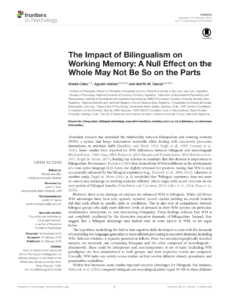The impact of bilingualism on working memory: A null effect on the whole may not be so on the parts
Frontiers in Psychology: Language Sciences
Calvo, N., Ibáñez, A. & García, A. M. (2016). The impact of bilingualism on working memory: A null effect on the whole may not be so on the parts. Frontiers in Psychology: Language Sciences 7, 265. Online: http://bit.ly/1QhFYOl.
Abundantes investigaciones han examinado la relación entre el bilingüismo y la memoria de trabajo (WM), un sistema que mantiene la información accesible al tiempo que se ocupa de procesos concurrentes, distracciones o cambios de atención (Baddeley y Hitch, 1974; Engle y otros, 1999; Conway y otros, 2002). Algunos estudios no han informado de diferencias en el WM entre bilingües y monolingües (Bialystok y otros, 2008; Feng, 2009; Bialystok, 2010; Namazi y Thordardottir, 2010; Bonifacci y otros, 2011; Engel de Abreu, 2011), lo que lleva a los principales estudiosos a sostener que este dominio es impermeable al bilingüismo. Por ejemplo, Bialystok (2009) afirmó por primera vez que WM es indiferente al desarrollo de un idioma no nativo (L2). Más tarde, reformuló ligeramente su posición, afirmando que WM sólo ocasionalmente se mejora por la experiencia bilingüe (por ejemplo, Bialystok et al., 2009, 2012). Asimismo, en otro estudio, Engel de Abreu (2011: pág. 6) llegó a la conclusión de que «la experiencia bilingüe no parece transmitir ninguna ventaja en las capacidades de la memoria de trabajo», lo que coincide con las recientes críticas a la propia noción de las ventajas del bilingüismo (Duñabeitia y Carreiras, 2015; Calvo y otros, 2016; Paap y otros, 2016).
Para acceder al artículo hacé click AQUÍ
The impact of bilingualism on working memory: A null effect on the whole may not be so on the parts
Frontiers in Psychology: Language Sciences
Calvo, N., Ibáñez, A. & García, A. M. (2016). The impact of bilingualism on working memory: A null effect on the whole may not be so on the parts. Frontiers in Psychology: Language Sciences 7, 265. Online: http://bit.ly/1QhFYOl.
Abundant research has examined the relationship between bilingualism and working memory (WM), a system that keeps information accessible while dealing with concurrent processes, distractions, or attention shifts (Baddeley and Hitch, 1974; Engle et al., 1999; Conway et al., 2002). Some studies have reported no WM differences between bilinguals and monolinguals (Bialystok et al., 2008; Feng, 2009; Bialystok, 2010; Namazi and Thordardottir, 2010; Bonifacci et al., 2011; Engel de Abreu, 2011), leading top scholars to maintain that this domain is impervious to bilingualism. For instance, Bialystok (2009) first claimed that WM is indifferent to the development of a non-native language (L2). Later, she slightly reframed her position, stating that WM is only occasionally enhanced by the bilingual experience (e.g., Bialystok et al., 2009, 2012). Likewise, in another study, Engel de Abreu (2011: p. 6) concluded that “bilingual experience does not seem to convey any advantage in working memory abilities,” which aligns with recent criticism on the very notion of bilingual benefits (Duñabeitia and Carreiras, 2015; Calvo et al., 2016; Paap et al., 2016).
To access the full paper please click here


